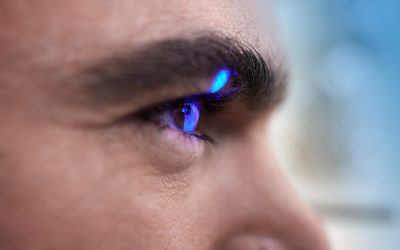More than twice as many people with visual impairments experience depression compared to those with normal vision. This startling statistic reveals a troubling connection that most people never consider: your mental health and eyesight influence each other in ways that can create a dangerous downward spiral.
Your mental state doesn’t just affect how you feel—it literally changes how you see.
The relationship works both directions. Emotional trauma can trigger genuine eye problems, while vision changes often spark anxiety and depression. Adults aged 65 and older with vision loss face nearly double the rate of anxiety and depression compared to those with normal sight. Your mental state doesn’t just affect how you feel—it literally changes how you see.
Chronic anxiety frequently leads to visual disturbances including blurred vision, light sensitivity, and tunnel vision. Research consistently demonstrates that as vision problems progress, emotional strain intensifies, sometimes developing into full anxiety or depression. This creates a concerning cycle where vision loss worsens mental health, which then further damages eyesight.
Your eyes and mind deserve better protection than this destructive pattern allows. Understanding how psychological stress manifests as real vision problems and recognizing the warning signs that demand immediate attention can protect both your mental health and your eyesight. This guide explores the surprising connections between what’s happening in your head and what you see with your eyes, helping you identify when these symptoms warrant professional care.
The Hidden Ways Depression Can Affect Your Vision
Depression affects your vision through pathways most people never consider. Not only does your mental state influence your mood, but it also alters the neurological processes that control sight.
Blurry vision & visual fatigue
People experiencing depression frequently notice their vision lacks clarity, making fine details difficult to discern. This isn’t the kind of blurriness that glasses can fix. The problem persists and often intensifies during depressive episodes, creating a frustrating cycle where poor vision compounds emotional distress.
Visual fatigue strikes people with depression with surprising severity. Studies reveal that individuals with visual impairments are four times more likely to have severe fatigue impacts during normal daily life. The connection has been found to work both ways as depression ranks among the strongest factors contributing to eye-related fatigue.
This exhaustion isn’t just feeling tired after reading. Your eyes literally work harder to process visual information when depression affects your brain’s processing centers.
Light sensitivity & eye strain
Bright environments become unbearable for many people with depression. Research shows that those sensitive to bright light have 80% higher odds of experiencing depressive symptoms. This sensitivity forces people to wear sunglasses indoors or avoid well-lit spaces entirely, further isolating them from normal activities.
Eye strain accompanies this sensitivity, manifesting as watery eyes, dry eye syndrome, and persistent discomfort. These symptoms worsen during depressive episodes because motivation to seek treatment declines. The result: treatable eye problems go unaddressed, creating unnecessary suffering.
Understanding the mind-eye connection
A study from the University of Freiburg found that people with major depression showed greater difficulty distinguishing between black and white patterns compared to those without depression. This reduced contrast sensitivity explains why depressed individuals often describe “seeing the world in gray.”
The mechanism behind this connection reveals how intertwined your mental and visual health truly are. Mental stress impairs vascular function in your eye structures, leading to vision problems. These vision changes then cause more emotional distress, which further worsens your eyesight.
Most eye doctors focus exclusively on physical causes of vision problems. However, recognizing how your psychological state directly influences what you see is essential for effective treatment. It’s important to consider that depression may not be just affecting your emotions, rather it may also be changing the way your visual system operates.
The Science Behind Vision & Mental Health
Your eyes function as direct extensions of your brain, sharing the same neural tissue and blood supply. This biological reality explains why depression not only affects your mood but also fundamentally alters how your visual system processes information.
How your brain processes what you see
Visual processing involves far more than your eyes simply sending images to your brain. Depression specifically alters cortical processing of visual information rather than retinal processing. This means the problem isn’t with your eyes themselves, but with how your brain interprets what they see.
Think of your visual system as an integrated network. The occipital cortex processes visual information, while the frontal lobe controls emotions, creating an interconnected system. Scientists have discovered that saccade eye movements correlate with long-distance occipital-frontal connectivity in the brain. This connection explains why emotional states directly influence visual perception.
As noted earlier in this article, research at the University of Freiburg found that people with major depression had greater difficulty distinguishing between black and white colors on checkerboard patterns compared to non-depressed individuals. This reduced contrast sensitivity helps explain why depressed people often describe “seeing the world in gray” as reality rather than as a metaphor.
How stress affects your eyes
When stress strikes, your body releases cortisol and adrenaline as part of the fight-or-flight response. These hormones cause pupils to dilate for better threat detection, but chronic exposure creates more serious problems.
Elevated stress hormones can lead to increased intraocular pressure (IOP). Over time, this pressure may damage the optic nerve and contribute to conditions like glaucoma. Research reveals a dangerous pattern: mental stress impairs vascular function in the eyes, which worsens vision, thereby causing more emotional distress.
This creates the troubling cycle mentioned earlier, but now you understand more about the biological mechanism behind it.
Can emotional trauma cause eye problems?
Yes, it can. Post-Traumatic Stress Disorder (PTSD) frequently accompanies visual disturbances known as Post-Traumatic Vision Syndrome (PTVS). Studies on individuals with PTSD found they exhibit distinctive pupillary responses. For example, their pupils dilate significantly more when exposed to emotional images, regardless of whether the images are threatening or positive.
Trauma essentially disrupts the neurological system that controls information flow between the brain and eye-controlling muscles. This disruption can manifest as blurred vision, eye strain, light sensitivity, and difficulty with depth perception even years after the traumatic event.
The eye truly serves as a window into brain health, making it susceptible to the same chemical and neurological influences that affect your mood. Understanding these connections helps explain why vision problems and mental health issues so often occur together.
Beyond Depression: When Anxiety and Stress Attack Your Vision
Anxiety and chronic stress create their own unique threats to your visual system. While depression changes how you process what you see, anxiety disorders trigger immediate physical responses that can damage your eyes in ways you might never expect.
Anxiety’s effect on your sight
One in four adults with vision impairment report experiencing anxiety or depression. Anxiety rarely causes permanent vision loss directly, but it creates a troubling pattern of visual disturbances that can persist long after the anxious feelings fade.
When anxiety strikes, your body floods with stress hormones that cause pupils to dilate and muscles around your eyes to tense. These physical changes frequently result in blurred vision, eye strain, and heightened sensitivity to light. Some people find that anxiety symptoms persist despite treatment because subtle eye misalignments contribute to their distress, potentially requiring specialized aligning lenses.
The cycle becomes self-perpetuating: anxiety triggers vision problems, and vision problems intensify anxiety, creating a troublesome loop that many people struggle to break.
What happens to your eyes during panic attacks
Panic attacks dramatically alter your vision through several distinct mechanisms. When you hyperventilate during an anxiety attack, the imbalance of oxygen and carbon dioxide in your body commonly causes temporary blurry vision. Your peripheral awareness often fades as well and causes a phenomenon called tunnel vision. This occurs because your body is focusing visual resources on the perceived threats.
Double vision can occur during panic episodes due to excessive tension in eye muscles that prevents proper coordination.
Interestingly, driving on freeways ranks as one of the most common triggers for anxiety attacks in susceptible individuals, largely because visual processing demands peak during high-speed driving.
How chronic stress damages your retina
Long-term stress attacks your eyes at the cellular level. Studies reveal that chronic stress induces retinal vascular dysfunction and impairs autoregulation of retinal arterioles. Research comparing stressed versus non-stressed individuals found those with chronic stress showed dramatically higher rates of hypertension (75% vs. 16%), diabetes (13% vs. 0%), and retinopathy (57% vs. 45%).
Elevated cortisol levels from ongoing stress may damage blood vessels in your retina and contribute to conditions like central serous chorioretinopathy, a condition where fluid builds up under the retina. This creates a dangerous feedback loop where stress-induced retinal problems cause vision changes, which subsequently generate more stress and anxiety, further damaging your eyesight.
If you are having recurring or long-term stress episodes, schedule a comprehensive eye exam with the ophthalmologists in Pittsburgh at Chang Eye Group. Our eye care experts can evaluate your condition and provide the appropriate treatment for you.
Warning Signs That Demand Your Attention
Certain symptoms signal when the connection between your mental health and vision has become dangerous. Recognizing these warning signs could save your eyesight from permanent damage.
When vision changes happen without warning
Any sudden change in your vision requires immediate medical attention. Seek emergency care for abrupt blurriness, vision loss, or new floaters, especially when no physical injury explains these symptoms. These problems might indicate psychogenic vision issues related to psychological trauma.
Don’t wait if you experience stroke-like symptoms with visual disturbances. Delayed treatment could cost you permanent vision loss.
Your eyes require immediate professional evaluation when sudden changes occur without clear physical causes.
Headaches that won’t go away
You should see a doctor if headaches occur twice or more weekly or if you need pain relievers most days. This becomes especially concerning when headaches accompany visual disturbances, light sensitivity, or persistent eye strain. These symptoms often intensify during depressive episodes, creating a pattern that requires professional attention.
Feeling detached from reality
Depression and anxiety sometimes manifest as feeling disconnected from yourself or your surroundings. Mental health professionals call these experiences depersonalization and derealization. When combined with visual distortions that affect depth perception, these symptoms require immediate evaluation.
Schedule an eye exam with Chang Eye Group in Pittsburgh if you experience these disconnected feelings alongside vision problems. The combination of psychological and visual symptoms often indicates conditions that respond well to early intervention.
Vision problems that follow your moods
Pay attention when your vision problems worsen during emotional stress or improve when your mood lifts. Research demonstrates that people with depression often develop reduced contrast sensitivity where they literally see the world with less vibrant colors. This creates a troubling pattern where vision problems intensify depression, which then worsens vision issues.
Your vision shouldn’t fluctuate with your emotional state. When it does, both your mental health and eyesight need professional care.
Protecting Both Your Vision and Mental Health
Your mental health and eyesight share connections that extend far deeper than most people realize. The evidence throughout this guide reveals a fundamental truth: depression and anxiety not only affect your emotions, but they also create measurable changes in how you see the world.
How can you take action? When you recognize that blurry vision during depressive episodes isn’t “all in your head,” you can seek appropriate care. When you understand that light sensitivity and eye strain often accompany anxiety, you can stop dismissing these symptoms as minor inconveniences. The neurological links between your brain’s emotional centers and visual processing systems explain why these experiences feel so real—because they are real!
Never dismiss warning signs that connect your vision and mental health. If you have sudden vision changes without physical cause, recurring headaches with visual disturbances, feeling disconnected from reality, or vision problems that fluctuate with your emotional state then you should seek professional evaluation. These symptoms represent your body’s way of signaling that something needs attention.
Remember that addressing one area often improves the other. Taking steps to protect your mental health frequently leads to better vision, while treating vision problems can reduce anxiety and depression. This interconnected relationship works in your favor when you approach both aspects of your health with equal seriousness.
Your eyesight deserves the same careful attention you give to other important aspects of your health. Rather than waiting for problems to worsen, schedule regular eye exams that can detect both vision issues and signs of stress-related damage before they become serious.
Chang Eye Group in Pittsburgh provides comprehensive eye exams that consider the complete picture of your visual and overall health. Our experienced team understands the connections between mental health and vision, offering personalized care that addresses your unique needs. Don’t let the hidden connections between depression and vision compromise your sight. Call Chang Eye Group today to schedule your appointment at one of our convenient locations in Pittsburgh.
FAQs
Q: Can depression really affect my eyesight?
A: Yes, depression can impact your vision. People with depression often report blurred vision, increased light sensitivity, and visual fatigue. These symptoms are due to the neurological links between mood and sight, as well as the effects of stress hormones on eye function.
Q: What are some common vision problems associated with anxiety?
A: Anxiety can cause various vision issues, including blurred vision, eye strain, light sensitivity, and even temporary tunnel vision during panic attacks. Some individuals may also experience double vision due to excessive tension in the eye muscles.
Q: How does chronic stress impact eye health?
A: Chronic stress can lead to retinal vascular dysfunction and impair the autoregulation of retinal arterioles. It may also contribute to conditions like central serous retinopathy, where fluid builds up under the retina. Long-term stress can increase the risk of hypertension, diabetes, and retinopathy.
Q: When should I seek professional help for vision changes related to mental health?
A: You should seek professional help if you experience sudden vision changes without a physical cause, recurring headaches with visual disturbances, feelings of disconnection from reality, or vision issues that worsen with mood swings. These symptoms may indicate a connection between your vision and mental health.
Q: Can emotional trauma cause eye problems?
A: Yes, emotional trauma can lead to eye problems. Post-Traumatic Stress Disorder (PTSD) is often accompanied by visual disturbances known as Post-Traumatic Vision Syndrome (PTVS). Symptoms may include blurred vision, eye strain, light sensitivity, and difficulty with depth perception, which can persist long after the traumatic event.





